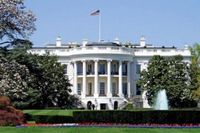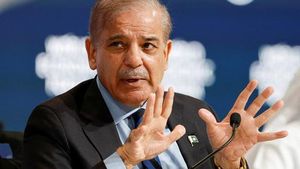The United Arab Emirates (UAE) has made a significant commitment to the United States, pledging to invest a whopping $1.4 trillion in the American economy over the next decade. This decision, which aims to bolster economic ties between the two nations, was reported by Reuters with details provided by a White House representative.
The announcement follows high-level meetings between UAE officials and President Donald Trump during the week of March 15, 2025. According to the White House, these investments will focus on key sectors including artificial intelligence, semiconductors, energy, and manufacturing. This new investment initiative is expected to significantly enhance the existing UAE investments in the US, which have already been substantial.
A major aspect of this investment is the collaboration between the UAE investment fund ADQ and American company Energy Capital Partners. Together, they are setting up a $25 billion project aimed at developing the energy infrastructure and data processing centers in the United States. This project is set to enhance the technological landscape and create numerous jobs across the nation.
Additionally, XRG, the international investment division of the state-owned oil company ADNOC, plans to invest in the extraction and export of natural gas to the US. This includes funding for the construction of a liquefied natural gas facility in Texas, which stands to be a critical component of energy solutions linking the two countries.
The representatives from the White House have been vocal about the significant impact this investment could have. They highlighted that the infusion of capital into American assets related to the gas and chemical industry, as well as energy infrastructure, is particularly noteworthy. They are particularly keen on solutions that align with low emissions, which shows an adapting focus on sustainability within these large-scale projects.
"This investment will not only enhance our economies but also foster advanced technologies that will benefit both nations," a White House official stated. This sentiment echoes the broader objective of fostering cooperation that extends beyond mere financial investment to building a cooperative technological future.
As part of a context for this substantial pledge, it’s important to note that earlier in March, President Trump announced a visit to Saudi Arabia following their commitment to invest $1 trillion in American military technology and goods over the next four years. This visit signals a burgeoning trend of Middle Eastern nations eager to invest heavily in American infrastructure and technology, perhaps recognizing the strategic gains such partnerships can engender.
During his previous engagement in Saudi Arabia, Trump had secured an agreement worth $450 billion, a deal that appears to have set the stage for these more recent commitments from both the UAE and Saudi Arabia. In his own words, Trump remarked, "They gave me $450 billion then, and now they're wealthy enough to give me a trillion dollars – and I’ll go visit them first. That’s a deal worth making."
In summary, the UAE’s pledge to invest $1.4 trillion over the next decade highlights a committed shift in the geopolitical landscape, marking a significant strengthening of relations between an oil-rich Middle Eastern state and a global economic powerhouse. The focus on investments in advanced technology sectors reflects a strategic vision not only for economic growth but for sustainable development in this changing landscape. This relationship, fostered through high-level diplomacy, promises to impact both nations' futures positively.
As the details surrounding this investment unfold, both governments will likely monitor the outcomes closely, hoping for a partnership that furthers both technological advancements and employment opportunities within the US, while also reinforcing the UAE's emerging role as a key player in global economic strategies.






